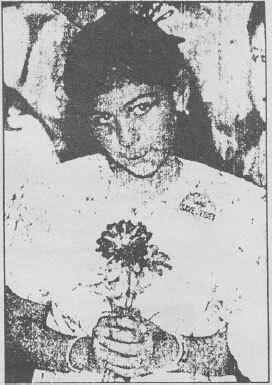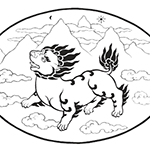| The following article is from the Autumn, 1990 issue of the Snow Lion Newsletter and is for historical reference only. You can see this in context of the original newsletter here. |
By Lori Campbell
Free Press Staff Writer
Scrunching his eyes and laughing in a high-pitched hee-hee-hee, the Dalai Lama leader of 14 million Buddhists and a Nobel Peace Prize winner won over Vermont children Friday.
In the Buddhist tradition of the teacher questioning students to help them find answers within themselves, the Dalai Lama spent an hour Friday morning asking children their thoughts on war, animals, religion and culture.
At the hour's end, he bowed his head and thanked the children, telling them, You are my teacher.
The Dalai Lama, a great lover of children, agreed to meet several elementary school classes of 6-to 11-year-olds under a tent on the front lawn of the Middlebury College's Hadley House, where he is staying during visit through Monday.
With one hand propped on his knee, and his other hand holding a long-stemmed white carnation, the Dalai Lama asked the children, What are your feelings toward insects and animals?
Many children eagerly held up their hands for him to call upon. One girl answered, I enjoy being with insects but mostly with animals because they give you as much love as your family and friends. Mosquitoes, I like to slap.
The Dalai Lama laughed and said, Oh, very practical.
Another boy answered, I think people who hunt, they don't think about the deer, they just think about the meat. The Dalai Lama nodded.
Another boy answered, I like all insects but not grasshoppers.
At this, the Dalai Lama laughed hee-hee-hee, and talked in his Tibetan language to his interpreter, who translated for the boy, But grasshoppers do challenge you because if you try to catch them, they are hard to catch.
What do you think of the military thing, those very beautiful weapons and smart uniforms? the Dalai Lama asked the children.
A boy answered, For some people it might be attractive, but if they ever go into war, they will not think it's good.
Why? War is beautiful, the Dalai Lama said.
A girl answered, Sometimes people think they gain, but they don't think about lives lost.
Another boy said, I think war is bad because you use Earth's treasures to destroy.
Even children too young to understand the Dalai Lama came to see him in their parents' arms.
Stacey Douglas-Manzelmann of Middlebury brought her 7-month-old son, Tenzin, to see the Dalai Lama because, I wanted him to be in the presence of this peaceful, great person, she said.
Manzelmann named her son after the Dalai Lama, whose name is Tenzin Gyat-so, because, We wanted him to be a peace worker.
Another young mother, Stacey Dobek, brought her two small children for the same reason.
I wanted them to be in his presence. I really did. He is a constant reminder of ultimate human compassion. I wanted them to see him in person. Cassidy (her 4-year-old daughter) said, When is he going to talk to me?' I felt moved that he was trying to learn from the children.
As the Dalai Lama left, children gave him flowers and small, handmade gifts. One boy gave the Dalai Lama a silver star sticker crumpled in his hand. The Dalai Lama accepted it as if it were an honored prize. He shook the children's hands as he returned to the Hadley House.

AddieRose Mayer, a fourth-grader at Mary Hogan Elementary School in Middlebury, waits for the Dalai Lama.
Oh man! a double handshake. I got a double handshake, exclaimed John Dow, 11, from Middlebury.
I liked his laugh, said Rhiana Welch, 11, of Middlebury. And I liked his haircut. He doesn't consider himself a really big deal. He considers himself like you and me.
When he asked us Do you like your mom or dad better?' I think he was kidding, said Owen Foster, 11. I think he was checking our sense of humor.
As a child, the Dalai Lama was identified as a possible Buddhist leader at the age of 2 after a search through the Tibetan countryside. After passing numerous tests, like picking out a belonging of the former Dalai lama among other objects, he was recognized as the new leader, and he went to Tibet's capital to learn the Dalai lama ways.
At the age of 15, with three years of schooling left before he undertook the Dalai lama position as spiritual and secular leader, he had to flee his country with the Chinese invasion of 1950.
He formed a government and country of exile within India and took care of 100,000 refugees. He established large-scale agricultural settlements and built schools. Between 1959 and 1965, he appealed several times to the United Nations for help in his Chinese-occupied country.
The United Nations released three resolutions in 1959, in 1961, and in 1965, calling for China to respect the human rights of Tibetans.
One of the reasons he got the Nobel Peace Prize awarded to him in 1989 was the way he dealt with his country's conflict. It has been peaceful, said Joseph Kroger, professor of religious studies at St. Michael's College in Colchester.
He has taken the slow peaceful route.
I liked his laugh. And I liked his haircut. He doesn't consider himself a really big deal. He considers himself like you and me.'
Rhiana Welch, 11,
of Middlebury

